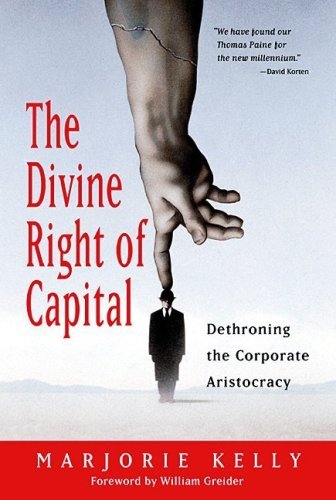

| THE DIVINE RIGHT OF CAPITAL Dethroning the Corporate Aristocracy Marjorie Kelly William Greider (Fwd.) San Francisco: Berrett-Koehler, October 2001 |
Rating: 5.0 High |
|||
| ISBN-13 978-1-57675-125-1 | ||||
| ISBN-10 1-57675-125-2 | 230pp. | HC/GSI | $24.95 | |
In 1215, British nobility gathered at Runnymede to force King John to sign the Magna Carta, the Great Charter that limited the power of the Crown over land. Later, in 1688, came the Glorious Revolution, in which Parliament asserted its right to give the Crown — to pass on the suitability of any king or queen of the Britons.1 Thus, Parliament became the true sovereign power in the British Commonwealth. Royal power in other countries would soon be similarly limited.
But, argues Marjorie Kelly, we have in America today (as in most other nations) an economic aristocracy that rivals the power of the political aristocracy of prior centuries. It consists in people of great wealth: principally the stockholders of corporations. They enjoy the proceeds earned by the corporation in perpetuity, but do little to create those proceeds. The rank-and-file employees of the corporations, meanwhile, generally earn a fixed income. Their efforts determine whether the company succeeds or fails; but success brings them little additional reward.
"One does not see rising employee income as a measure of corporate success. Indeed, gains to employees are losses to the corporation. And this betrays an unconscious bias: that employees are not really part of the corporation. They have no claim on wealth they create, no say in governance, and no vote for the board of directors. They're not citizens of corporate society, but subjects." "We think of this as the natural law of the market. It's more accurately the result of the corporate governance structure, which violates market principles. In real markets, everyone scrambles to get what they can, and they keep what they earn. In the construct of the corporation, one group gets what another earns." – Page 3 |
The legal system sanctions all this. But of course the legal system largely depends on income from corporate sources. American government, too, has come to be dependent on money from corporations. Business culture supports it as well; the notion that the stockholders are the corporation is pervasive, and the corollary idea that the primary duty of the corporation is to generate wealth for the stockholders is so widely held as to be invisible; to appear as the natural order of things, unquestionable. The corporate aristocracy, which benefits hugely from it, likes that view of reality.
"The great chain of being, in its day seemed like reality. It was a picture of reality that seemed so natural and inevitable that it was not scrutinized. Its bias was so pervasive as to be invisible—as the bias toward stockholders remains today. We see it not only in the corporation, but in treaties like the North American Free Trade Agreement, which puts financial concerns at the core and puts labor and environmental concerns into side accords. We see it in a business press that has trumped an era of great prosperity, while one in three workers made a poverty-level wage." – Page 27 |
But Marjorie Kelly aims to change that. Cofounder and former publisher of the journal Business Ethics, she has assembled a cogent assessment of the current situation, which is that the stockholders get to set a corporation's goals; and the goal they generally choose is more income for the stockholders.2 Rank-and-file employees have no say in the matter, and while CEOs and other managers make day-to-day operating decisions, they serve at the pleasure of the stockholders.3 Concerning the effects of this situation on society, she does not mince words:
"One might add, parenthetically, that the custom of investor primacy once permitted piracy—as seafaring vessels were legally permitted to attack other ships and seize their cargo. Things are little different today, as corporations loot pension funds, degrade public resources, and demand corporate welfare. The world might be laid waste in the interest of not wasting investor money. One might suppose even modestly civilized thinking would have led us by now to carve out a "piracy exemption," saying corporations should maximize returns to shareholders, except they should avoid piracy. But we haven't even gotten that far yet." – Page 53 |
She supports her assessment with numerous references to other books, and through exemplary legal scholarship illuminates both decisions that bolster the status quo and some that offer the hope of one day making the business world more equitable. For, while her words ring with revolutionary rhetoric, and she makes frequent reference to the American Revolution and the writings of its Founding Fathers, it is actually evolution she seeks. This can be seen the practical suggestions she makes in her final chapter (titled "A Little Rebellion") — suggestions which boil down to educating the public about alternatives. Here also, and throughout the book, are examples of the necessary changes already occurring; and, wonder of wonders, they are usually profitable.
In short, this is a book which convincingly makes the case that economic democracy is vitally needed and can be achieved without massive disruption — both of which tenets are anathema to today's plutocrats. For that reason alone I would give it top marks. But there is much more of value in these pages: a set of legal citations which can be used to bolster the case going forward; and a number of titles for additional support on various points. The Divine Right of Capital, therefore, is very much a keeper.4

 To contact Chris Winter, send email to this address.
To contact Chris Winter, send email to this address.